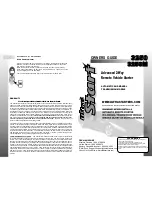
ConneXions II V7 SDC DC, Single Port Version
CONV7SDC 07/05
Issue 4
5
Installation
The following procedure must be adhered to when installing the ConneXions paging system. Ensure
you have taken into consideration all of the above information before selecting the location for your
transmitter. If in doubt please feel free to telephone the technical helpline on 01803 860710.
1
Remove the cover from the ConneXions II transmitter unit by slackening the four Pozi head
screws located at the top and bottom of the unit (see Diagram 1).
2
Carefully lift off the cover and set aside.
3
The transmitter should be fixed to an even wall surface using suitable screws fitted through
the holes provided in the chassis plate. Hold the chassis up to the chosen location and with
the aid of a pencil mark the position of the mounting holes.
Warning:
Do not use the chassis plate as a template for drilling the holes into the wall. Hammer drills
vibrating through the chassis may irreparably damage the quartz crystals on the printed circuit
boards.
4
Place the ConneXions transmitter over the mounting holes and secure the unit with suitable
screws. Check that the chassis plate does not bend and that the screws do not snag or pinch
any of the internal cables.
5
Connect the antenna to the unit via the BNC connector located at the top of the housing. If
the antenna is an external antenna, or an antenna which is separate from the transmitter unit
itself, ensure that the previous criteria covered under the section headed
Siting of the
Hardware
, have been strictly adhered to (also see section headed
Other Antennas
).
6
It is important to note that due to the number of interfaces brought out to the 9-way ‘D’
connector, great care should be taken to use only the lines which are applicable to your
installation. Failure to comply with this instruction will almost certainly DESTROY the unit.
In your application the transcoder has been configured as an RS232 input on PL2.
PL2 SERIAL PORT (9 way D Type Plug)
PIN SIGNAL
DIRECTION
1 N/C
2
RECEIVE DATA
(RX) IN
3
TRANSMIT DATA
(TX) OUT
4
DATA TERMINAL READY (DTR) OUT
5
GROUND (GND)
6 N/C
7
REQUEST TO SEND (RTS) OUT
8
CLEAR TO SEND
(CTS) IN
9 +5V
(for
Scope
peripherals)
As information passes only from the host equipment to the ConneXions transcoder, you will only need
to read the DTR line which if high shows that power is applied to the Connexions unit. The RTS line
will be high when the transcoder is ready to receive data. The ConneXions RTS line should be
connected to the host CTS line to facilitate correct handshaking.
Prior to connecting the data cable,
thoroughly check the system pin connections as shown above. Then connect the data cable from the
host to PL2 on the ConneXions unit
Note: PL1 (25 way D plug) is only used when the optional dry contact interface is fitted.
SKT1 (9 way D socket) is not used.































